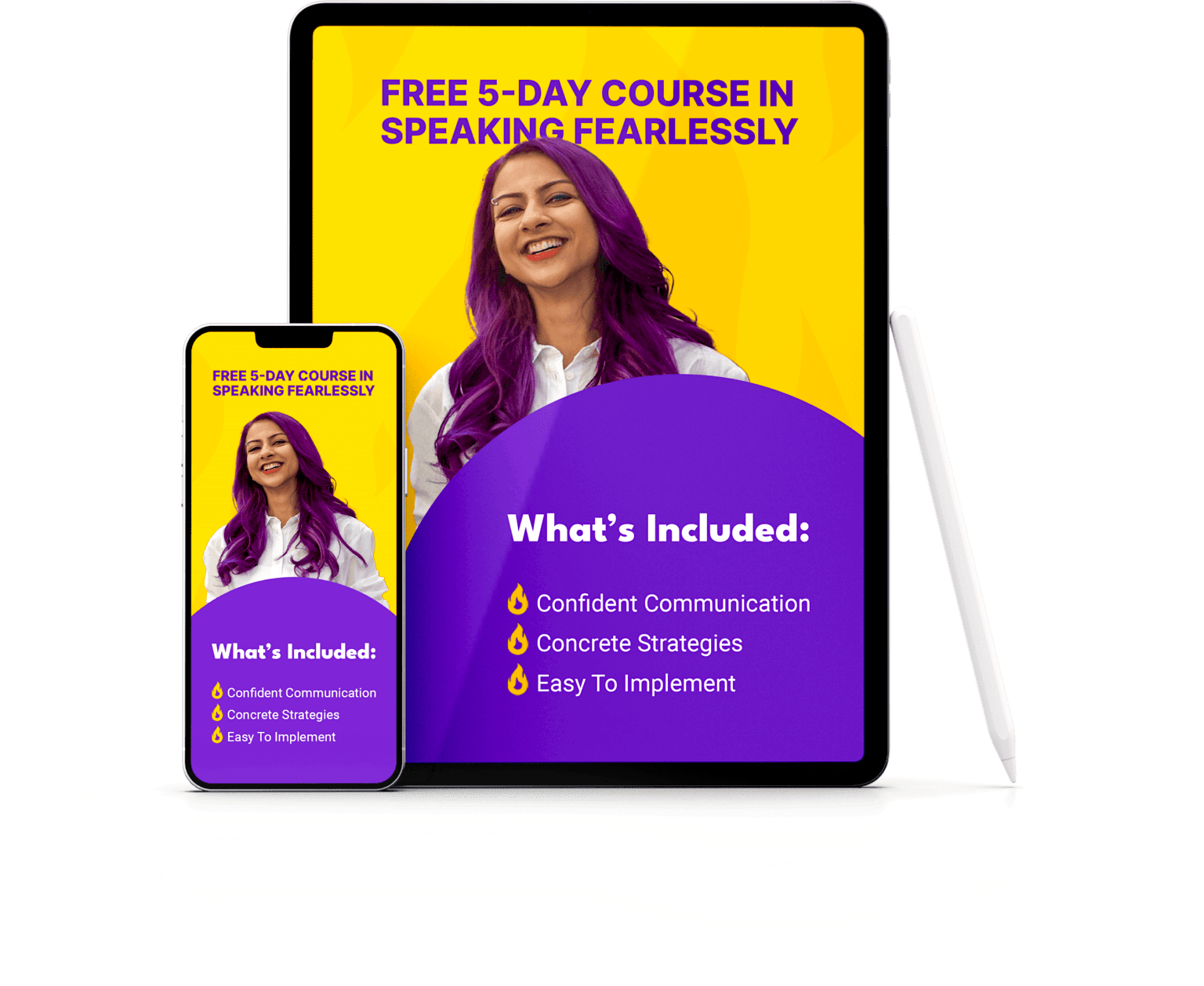
Photo by Fernand De Canne on Unsplash
“Nausheen, I’m not myself when I speak on camera. I sound like a nervous wreck. I don’t know why.”
My client – let’s call her Sarah -said this to me when we started working together. Sarah had achieved more success by the time she’d reached her mid-twenties than many people achieve in a lifetime. She was a thriving entrepreneur and a sought-after speaker and trainer… but she doubted herself because she was so young.
Because she didn’t think she deserved the spotlight, she couldn’t speak with confidence on podcasts and live events. She zipped through her talk, refused to make eye contact, and used too many filler words. Instead of looking confident, she appeared to be stressed. Nervous laughter rang out of her without permission.
With my help, she realized she had every right to be on any stage or podcast she was invited to. She learned that people wanted to hear her story of growth and that only she could tell her story.
In this article, I share with you the exact strategy we used to combat Sarah’s imposter syndrome so that you never feel like an imposter when you’re speaking in public.
Why do we experience imposter syndrome?
We typically feel this way because we’re worried we’re inadequate. We might feel like we’re not experienced or qualified enough for the role we’re in. We might feel like we ended up there by accident. We think: “There might be someone else more qualified than us”.
Imposter syndrome can negatively affect how you speak to an audience. It can erode your confidence and make you more nervous. This can lead to you fidgeting onstage, straining to speak because your throat is tight, and showing other mannerisms that undermine your authority.
When you know why you feel imposter syndrome, you can go on the offensive. Once you learn it’s something that everyone deals with (and how to fight back), you’ll kick imposter syndrome to the curb.

Here is a 9-step strategy that will help you overcome the imposter syndrome when you speak anywhere.
1. The “Judge Judy” method

Imposter syndrome throws all kinds of accusations at us:
- “You’re not an authority on this topic.”
- “You don’t know enough about this.”
- “You can’t talk in front of people.”
Take all these thoughts to court. Demand evidence for the accusations that imposter syndrome is trying to lodge at you, and prove them wrong. This ain’t your first rodeo! If you haven’t done a presentation like the one you’re about to do – you’ve done other presentations in the past. Even if you’ve never spoken in front of the entire department before – you’ve spoken to your team.
You’ve already built the skills you need to succeed at the next big talk, podcast, or presentation. But chances are, you’re not giving yourself credit for it. When you realize you’re actually the best person to speak on this subject, it’s a major confidence boost – and it’ll show onstage.

But what if this is your first rodeo? Don’t worry! Here are some tips to get you through:
- Remember, everyone starts somewhere. This is a learning experience for you, so shift your thinking to “What can I learn from this?” instead of listening to imposter syndrome.
- You can ask for help. If you don’t feel confident starting on your own, then get help from a speaking coach to conquer your nervousness, mental blocks, and inhibitions.
- Start out small. Don’t jump onto a huge stage from the start. Instead, record videos of yourself. You could also try speaking in front of smaller audiences.
2. Imagine a talk with your best friend
Take a moment to role-play. Step into the role of your best friend, and tell him or her all the things that imposter syndrome is telling you. How would they react to your negative self-talk?
Give your inner best friend a chance to speak his or her mind to your inner hater. Realize that those feelings are nonsense. Your best friend is one of the people who knows you best – so be kind to yourself as they would be!
My friend Marco André (ex-Google) took this strategy to the next level and named his inner critic. (He’s called Ralph). But he also named his inner best friend – Ruth. Then he proceeded to marry them. So wherever Ralph goes, Ruth follows. You can listen to this fascinating strategy and how it worked for him to eliminate his imposter syndrome in this podcast episode of Speak as a Leader.
3. Reframe your thoughts with “yet”
One small, three-letter word can make all the difference. When imposter syndrome is threatening to scare you into submission, tossing “yet” into the mix like a stick of TNT can give you all the power you need to keep going.
Say to yourself:
- “I’m not an authority on this topic… yet.”
- “I don’t know enough about this… yet.”
- “I can’t talk in front of people… yet.”

With this one word, you can turn limiting self-talk into limitless opportunity. You can challenge yourself to grow as a speaker instead of feeling defeated. In doing this, you reframe your thought processes from showing a lack of capability to creating the potential for growth.
4. Create a positive feedback loop (PFL)
Speaking in public is a big deal. When you’re doing something big like that, you can create a positive feedback loop:
Before your presentation, tell yourself “I’m ready!” Don’t just say it – believe it. Use evidence to show yourself why you’re ready. How long have you been preparing? What did you do to fine-tune your presentation?

During your presentation, say “I’m doing it!” Take a moment – while you’re still onstage – to marvel at the fact that you are doing something you once thought impossible.

After your presentation, say “I did it!” Take some time to reflect on what you did well during the presentation and what you can improve upon next time.

Photo by Martin Widenka on Unsplash
Checking in with yourself throughout the process can elevate your self-awareness, show yourself how you’ve grown and serve as a reminder that you can do it again in the future.
(That’s right – next time you have an opportunity to speak in public, consider it a big green check mark saying, “This ain’t my first rodeo!”)
Another tip to create a positive feedback loop: Save your “greatest hits” for days when you’re feeling down. Gather positive comments you get about your presentations. Save all your feedback and reviews in one place so you can groove to them later.
Don’t have a “greatest hits” yet? That’s OK – think of it from a learning perspective. Think back to the amount of information you knew when you first started in your field, and remember how far you’ve come since then.

Imposter syndrome says, “You can’t do this.” By acknowledging what you’ve already achieved, you can say back to it, “I have done this! I rocked it then and I’ll rock it again!”
5. The bug is a feature of your current version
Sometimes the pressure to be perfect can be paralyzing. You’re so worried that you’ll make a mistake that you’re not even sure you want to start. Re-frame how you approach your failures and you’ll be able to propel forward.
Think of your failures like a software bug
Everyone has flaws. Your “bugs” are just features of this version of you. You’re always learning – always developing a “new version” of yourself. Instead of focusing on the bugs, ask yourself if you want that bug in your next version. If you want to perform a “bug fix,” then create the version of yourself that you want to become!
You don’t have to be perfect. No one expects you to be, and a minor hiccup or two won’t ruin your entire presentation. You should even expect some problems and be prepared to adapt to them during your presentation, since there will always be a touchy sound system, slides that are a bit late, etc. The more prepared you are, the better you’ll be able to adapt.

6. “Screw it – I’ll do it!”
We’ve all experienced it: you’re confronted with a challenge. You’ve been asked to do something you have never tried before. It’s big and scary, looming over you.
Will you fight through the discomfort, or run away screaming?
This is called your “fight or flight” response. When your fight or flight response kicks in, do it anyway! When you do scary things, your future self gets further away from the “imposter” you thought you were. Stand and fight!

But here’s a watch out: you shouldn’t live in fight or flight mode. If you’re always trying something new, you don’t give yourself time to improve and become an expert. So try something new, and then start learning and growing there before you move on to something else.
7. Acknowledge your accomplishments
Think back to one of your past speaking successes (the more specific, the better). Remind yourself that you’ve been asked again to share your experience and expertise.
You might think your knowledge is common and everyone has it, but you only feel this way because you’re growing. Even if you think you’re always a step behind everyone, you need to realize that, to the people coming after you, you seem to be light-years ahead.
When you give in to imposter syndrome, you’re not giving yourself enough credit for your expertise. You’ve been given this stage or opportunity for a reason: because of your experience.

Bonus: Consider talking about your accomplishments during the presentation. You will add credibility to your words and give your audience a reason to listen to you.
(Remember, it’s not bragging if it’s true!)
8. Practice and Prepare
Build in a lot of time to practice your presentation or to rehearse for your podcast. The more prepared you are, the less room imposter syndrome will have to take hold.
How early should you practice?
Whatever amount of time you have, you should be spending at least half of it to practice the presentation.
How long should you practice?
The frequency and duration of your practice depend on your comfort level. It should happen several times a week, but more important than frequency or duration is your strategy.
What is one thing you want to get better at? During the practice session, focus on improving it. Afterward, debrief and share it with your coach. Give yourself feedback so you can see what you did well and what you improved on.
Where should you practice?
You can practice in many ways – you can record yourself speaking to a camera, you can present or do a mock interview with a friend or your partner, you can go practice your talk at small events. You should aim to do a mix of practicing by yourself and in “live” scenarios with an audience.
Two informal types of events where you can start practicing your public speaking skills are open mic storytelling events and Toastmasters meetings. The goal here is to get used to performing under pressure.

This crucial piece – practice – can most reliably help you avoid imposter syndrome. By taking time to practice and prepare ahead of time, you’ll know that you did the best you possibly could during the presentation, podcast or live event.
9. Focus on serving your audience
Being on stage can be intimidating. “Everyone is looking at me!”
But if you can shift your mindset from self-doubt to “How can I serve this audience?” you’ll take the spotlight off the “bugs” in your system and toward helping others.
The truth is that your audience is there to benefit from your experience, not to judge you. If you do well, they’ll have used their time wisely – so they want you to do well too.
People are better when they’re focused on serving others. When you focus on helping people, you’ll find that you’re more confident and more sure of yourself.
Conclusion
Imposter syndrome is monstrous, but like the man hiding behind the curtain at the end of a technicolor movie, it’s not as intimidating once you have all of the information. Don’t let imposter syndrome steal your chance at making an impact – kick it to the curb with these tips.
Want to make a bigger impact as a public speaker? Hire me to coach you!

